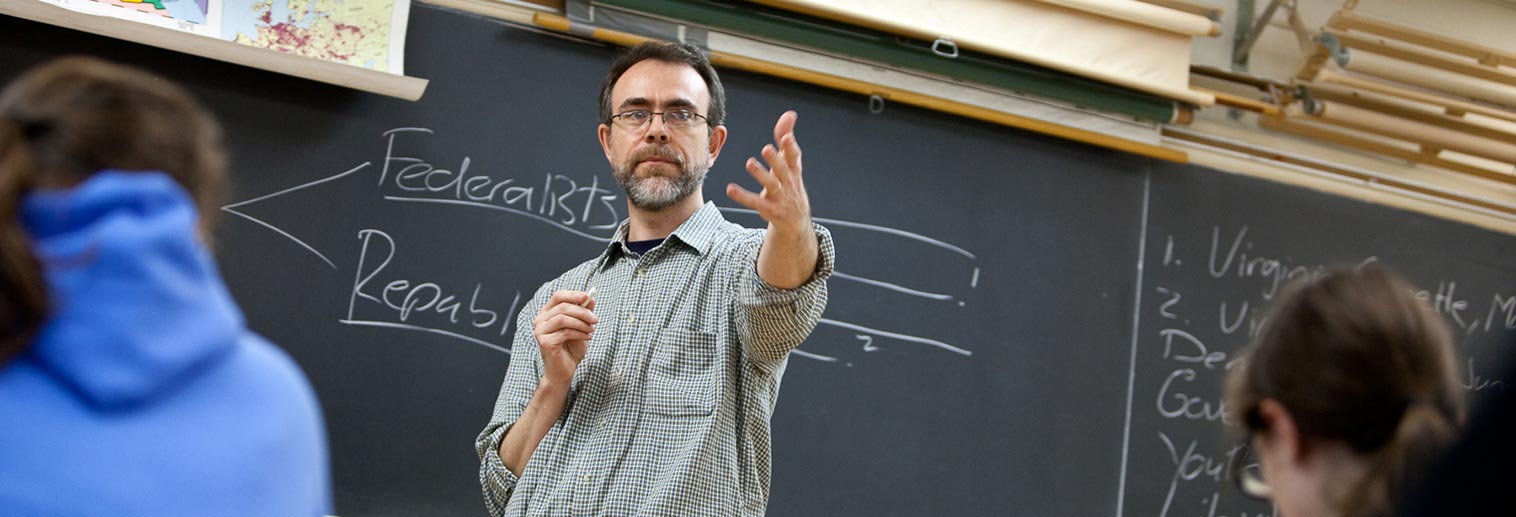Program of Study
The program in history acquaints students with the nature of historical inquiry and the antiquity and variety of human experience. Instead of relying on factual narratives, the program focuses on the analysis of primary sources, understanding history as a contested field of interpretations, and the skills of producing histories. The program prepares students to enter careers and graduate study in a variety of fields, including teaching and research, education, museums and historical restoration, library work, journalism, business, law, and public service.
The Major in History
The history major consists of 10 course units. Ordinarily students complete:
- Three 100-level courses, one dealing with Europe; one with the United States; and a third with an area outside Europe or the United States.
- Four 200-level courses, two of which must be History 270: Historical Methods and Interpretations and History 288: Internship in History.
- Three 300-level courses, one of which must be History 371: Senior Seminar. Only one of the courses numbered 381-388 may be used to satisfy the major requirements.
The Minor in History
The history minor consists of HIST 270: “Historical Methods and Interpretations” and four other courses to be selected from among at least two of the three major areas in the department curriculum (Europe, U.S., outside U.S. and Europe). In addition to History 270, at least one other course must be at the 200 or 300 level.
The Major in Historical Studies
Minimum requirements for the departmental major in historical studies are:
- History 112 or 116; History 113 or 114; one 100-level history course focusing on an area outside Europe or the United States; History 270; two additional history courses at the 200 level and two at the 300 level, to include at least one course each in United States history, European history, and history of an area outside Europe and the United States.
- Political Science 110 and 115 or 125 or a political science course in an international topic, chosen in consultation with an advisor.
- Interdisciplinary Studies 110 (World Geography and Global Issues).
- Economics 152 (not required for middle level certification).
Students whose background in history makes them eligible to waive one or more introductory courses may substitute an additional history course or courses numbered 210 or above. Students are encouraged to take more courses in history or political science in order to prepare better for teaching.
The Public History Certificate
Students in any major can earn the Public History Certificate! This interdisciplinary program explores the theories and methods of producing history for general, non-academic audiences. Students will explore the many ways history shapes our present-day world through collaborative and experiential learning.
The Public History Certificate offers students the opportunity to create and share knowledge in multiple formats, including documentary films, social media videos, podcasts, art installations, archaeological digs, libraries and archives, walking tours, and more!
The program combines classroom study, hands-on workshops, and group projects with off-campus partner organizations such as the National Museum of Industrial History, Historic Bethlehem Museum and Sites, the Moravian Historical Society, Steelworkers Archives, and the Moravian Archives.
No matter what career students are pursuing, they’ll gain practical experience and develop transferable skills in digital media, public outreach, storytelling, and community-based research that are in demand in the job market!
The requirements for the Public History Certificate are five courses with at least one at the 300 level:
Core (Required) Courses: HIST 266: Introduction to Public History and HIST 288: History Internship
Electives (choose three): IDIS 120-MILE 102: Filming Family Histories; ART 119: Art Processes and Structures; ART 125: Art in Public Places; ART 155: Communicating with Social Media; ENGL 216: Professional Writing; ENGL 224: Introduction to Journalism; ENGL 230: Public Speaking; ENGL 263/363: Writing as Activism; ANTH 235: Anthropology of Tourism; HIST 265: Experimental Archaeology; HIST 267/COMM 267: Video Storytelling; ART 254: Digital Video; ART 268. Digital Photography; and HIST 365: Oral History and Podcasting
Interested in pursuing the Public History Certificate?
Contact
Dr. Richard Anderson, Assistant Professor of Public History
andersonr03@moravian.edu

